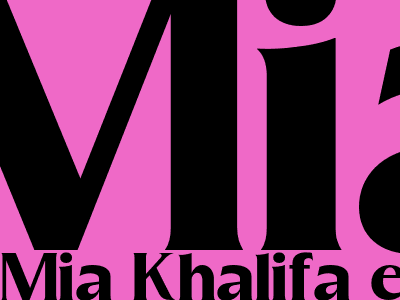
Mia Khalifa Details Shocking Example of How Her Past Career Still Affects Her Daily Life
Former Adult Film Star Opens Up About Persistent Stigma and Discrimination
Khalifa's Experience Highlights Challenges Faced by Individuals with Non-Traditional Backgrounds
In a recent interview, Mia Khalifa spoke candidly about the lasting effects of her previous career in the adult film industry. Despite leaving the industry years ago, Khalifa revealed that she continues to face stigma and discrimination in her personal and professional life.
One particularly shocking example, according to Khalifa, occurred when she applied for a job at a well-known retail store. Despite having a strong resume and meeting all the job requirements, Khalifa was denied the position solely because of her past career. The store manager told her that her "image" did not align with the company's brand.
Khalifa's experience is not unique. Many individuals who have worked in non-traditional industries or have unconventional pasts face similar challenges. The stigma associated with these backgrounds can create barriers to employment, housing, and even social acceptance.
Understanding the Stigma and Discrimination
The stigma surrounding non-traditional careers and pasts stems from societal biases and misconceptions. These biases can lead to discrimination, which is defined as treating someone unfairly based on their perceived characteristics or background.
In the case of former adult film stars like Khalifa, the stigma often stems from the perception that they are immoral, untrustworthy, or incapable of holding "respectable" jobs. This stigma can be reinforced by media portrayals, societal norms, and even laws that restrict their employment opportunities.
Challenges Faced by Individuals with Non-Traditional Backgrounds
Individuals with non-traditional backgrounds face a range of challenges, including:
- Employment discrimination: They may be denied jobs, promotions, or other employment opportunities due to their past or perceived affiliations.
- Housing discrimination: They may be denied housing or face higher rents and security deposits due to their background.
- Social stigma: They may be ostracized or excluded from social groups and activities due to their perceived status.
- Mental health issues: The stress and isolation caused by stigma and discrimination can lead to mental health problems, such as anxiety, depression, and substance abuse.
Breaking Down Barriers and Creating Inclusive Societies
To break down the barriers faced by individuals with non-traditional backgrounds, it is crucial to challenge societal biases and misconceptions. This can be achieved through education, awareness campaigns, and anti-discrimination laws.
Additionally, individuals and organizations can play a role in creating more inclusive societies by:
- Educating themselves about non-traditional careers and pasts.
- Challenging stereotypes and biases in their own thinking and behavior.
- Supporting individuals with non-traditional backgrounds by providing them with opportunities and resources.
- Advocating for policies and laws that protect individuals from discrimination.
By working together, we can create a more equitable and just society where everyone has the opportunity to succeed, regardless of their past or perceived background.